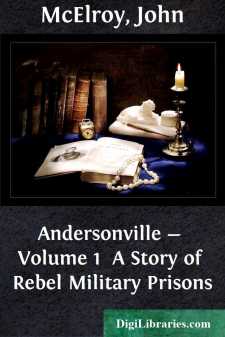Categories
- Antiques & Collectibles 13
- Architecture 36
- Art 48
- Bibles 22
- Biography & Autobiography 815
- Body, Mind & Spirit 144
- Business & Economics 28
- Children's Books 18
- Children's Fiction 14
- Computers 4
- Cooking 94
- Crafts & Hobbies 4
- Drama 346
- Education 58
- Family & Relationships 59
- Fiction 11833
- Games 19
- Gardening 17
- Health & Fitness 34
- History 1378
- House & Home 1
- Humor 147
- Juvenile Fiction 1873
- Juvenile Nonfiction 202
- Language Arts & Disciplines 89
- Law 16
- Literary Collections 686
- Literary Criticism 179
- Mathematics 13
- Medical 41
- Music 40
- Nature 179
- Non-Classifiable 1768
- Performing Arts 7
- Periodicals 1453
- Philosophy 65
- Photography 2
- Poetry 896
- Political Science 203
- Psychology 44
- Reference 154
- Religion 515
- Science 126
- Self-Help 85
- Social Science 82
- Sports & Recreation 34
- Study Aids 3
- Technology & Engineering 59
- Transportation 23
- Travel 463
- True Crime 29
John McElroy
John McElroy (1846-1929) was an American writer and journalist best known for his Civil War memoir, "Andersonville: A Story of Rebel Military Prisons," published in 1879. His book provided a harrowing and influential account of the brutal conditions faced by Union soldiers held at Andersonville prison in Georgia. McElroy's writings not only chronicled his own experiences as a prisoner of war but also shed light on the larger issues of captivity and survival during the Civil War.
Author's Books:
Sort by:
by:
John McElroy
CHAPTER I. OUT ON PICKET THE BOYS SHOW THE DEACON A NEW WRINKLE IN THE CULINARY ART. SOME days later, Si had charge of a picket-post on the Readyville Pike, near Cripple Deer Creek. The Deacon went with them, at their request, which accorded with his own inclinations, The weather was getting warmer every day, which made him fidgety to get back to his own fields, though Si insisted that they were still...
more...
by:
John McElroy
THE ECONOMIC FUNCTIONS OF VICE FOR some inscrutable reason which she has as yet given no hint of revealing, Nature is wondrously wasteful in the matter of generation. She creates a thousand where she intends to make use of one. Imbued with the maternal instinct, the female cod casts millions of eggs upon the waters, expecting them to return after many days as troops of interesting offspring. Instead,...
more...
by:
John McElroy
AND WHAT BECAME OF IT. AFTER Si Klegg had finally yielded to his cumulative patriotic impulses and enlisted in the 200th Ind. for three years or until the rebellion was put down, with greater earnestness and solemnity to equip himself for his new career. He was thrifty and provident, and believed in being ready for any emergency. His friends and family coincided with him. The Quartermaster provided him...
more...
by:
John McElroy
CHAPTER I. THROUGH MUD AND MIRE DUTY'S PATH LEADS THE 200TH IND. SOUTHWARD FROM NASHVILLE. "SHORTY" said Si Klegg, the morning after Christmas, 1862, as the 200th Ind. sullenly plunged along through the mud and rain, over the roads leading southward from Nashville, "they say that this is to be a sure-enough battle and end the war." "Your granny's night-cap they do,"...
more...
by:
John McElroy
CHAPTER I. A SALIENT BASTION FOR THE SLAVERY EMPIRE. Whatever else may be said of Southern statesmen, of the elder school, they certainly had an imperial breadth of view. They took in the whole continent in a way that their Northern colleagues were slow in doing. It cannot be said just when they began to plan for a separate Government which would have Slavery as its cornerstone, would dominate the...
more...
by:
John McElroy
The fifth part of a century almost has sped with the flight of time since the outbreak of the Slaveholder's Rebellion against the United States. The young men of to-day were then babes in their cradles, or, if more than that, too young to be appalled by the terror of the times. Those now graduating from our schools of learning to be teachers of youth and leaders of public thought, if they are ever...
more...
by:
John McElroy
Chapter I. A Declaration. "O, what is so rare as a day in June?Then, if ever, come perfect days;Then Heaven tries the Earth if it be in tune,And over it softly her warm ear lays."—Lowell. Of all human teachers they were the grandest who gave us the New Testament, and made it a textbook for Man in every age. Transcendent benefactors of the race, they opened in it a never-failing well-spring of...
more...
by:
John McElroy
CHAPTER I. SHORTY BEGINS BEING A FATHER TO PETE SKIDMORE. "Come, my boy," Si said kindly. "Don't cry. You're a soldier now, and soldiers don't cry. Stop it." "Dod durn it," blubbered Pete, "I ain't cryin' bekase Pm skeered. I'm cryin' bekase I'm afeared you'll lose me. I know durned well you'll lose me yit, with all this...
more...
by:
John McElroy
INTRODUCTION. The fifth part of a century almost has sped with the flight of time since the outbreak of the Slaveholder's Rebellion against the United States. The young men of to-day were then babes in their cradles, or, if more than that, too young to be appalled by the terror of the times. Those now graduating from our schools of learning to be teachers of youth and leaders of public thought, if...
more...
by:
John McElroy
CLOTHING: ITS RAPID DETERIORATION, AND DEVICES TO REPLENISH IT—DESPERATE EFFORTS TO COVER NAKEDNESS—"LITTLE RED CAP" AND HIS LETTER. Clothing had now become an object of real solicitude to us older prisoners. The veterans of our crowd—the surviving remnant of those captured at Gettysburg—had been prisoners over a year. The next in seniority—the Chickamauga boys—had been in ten...
more...











